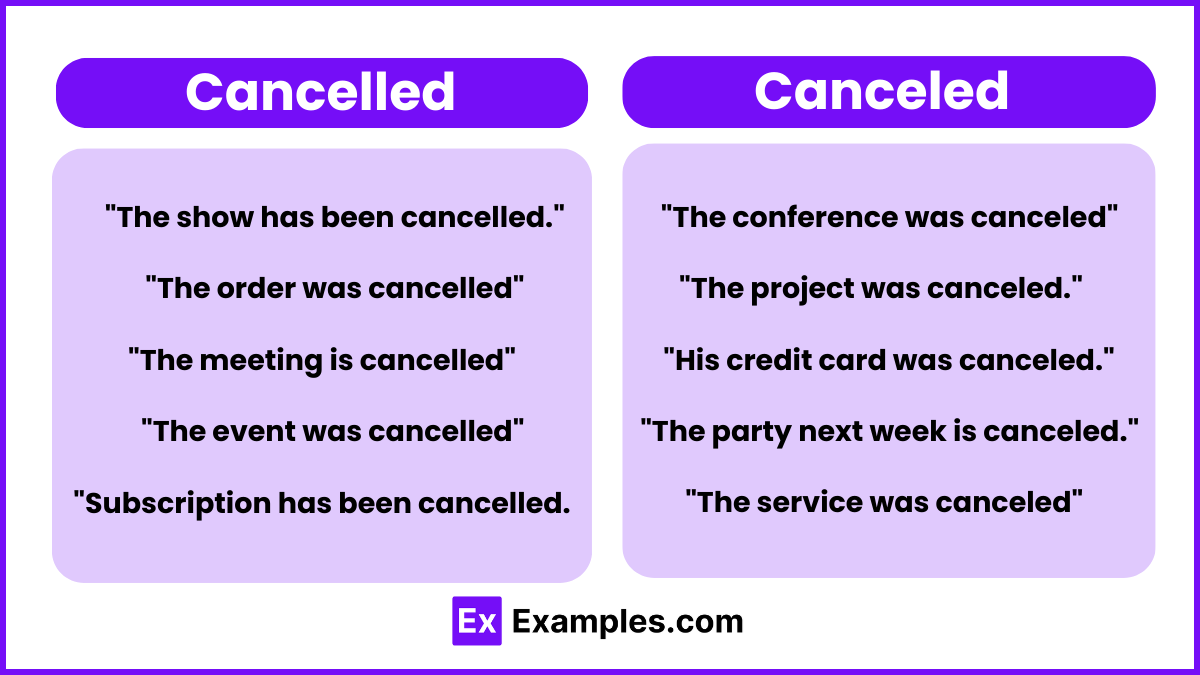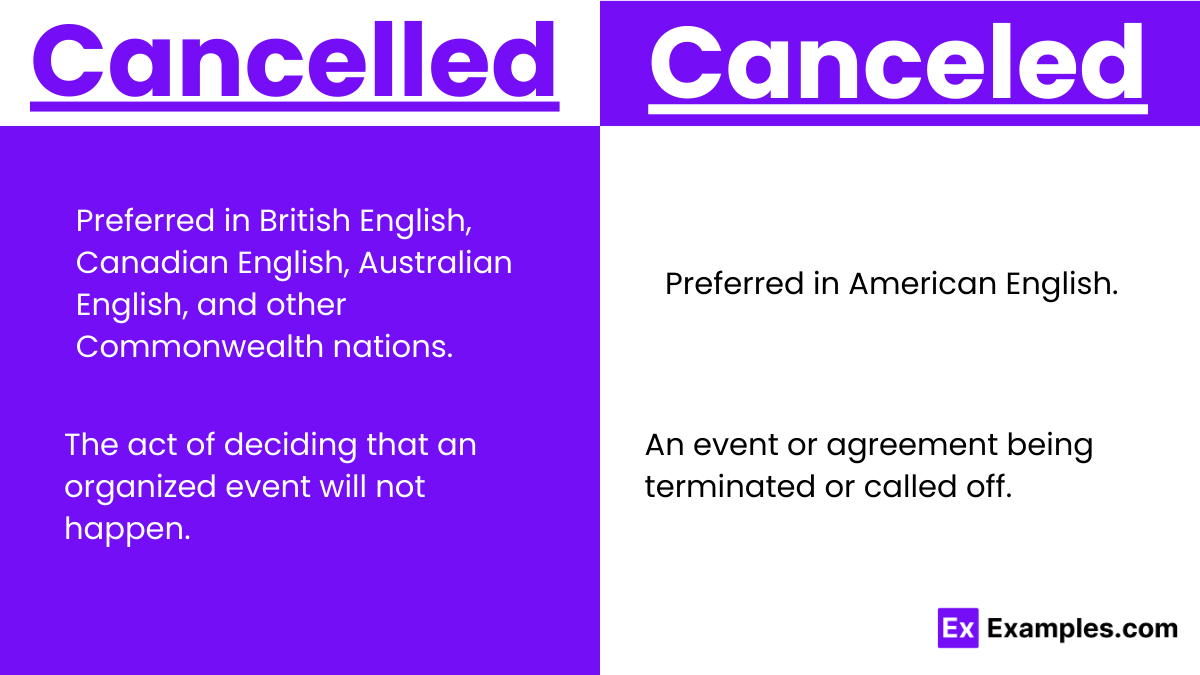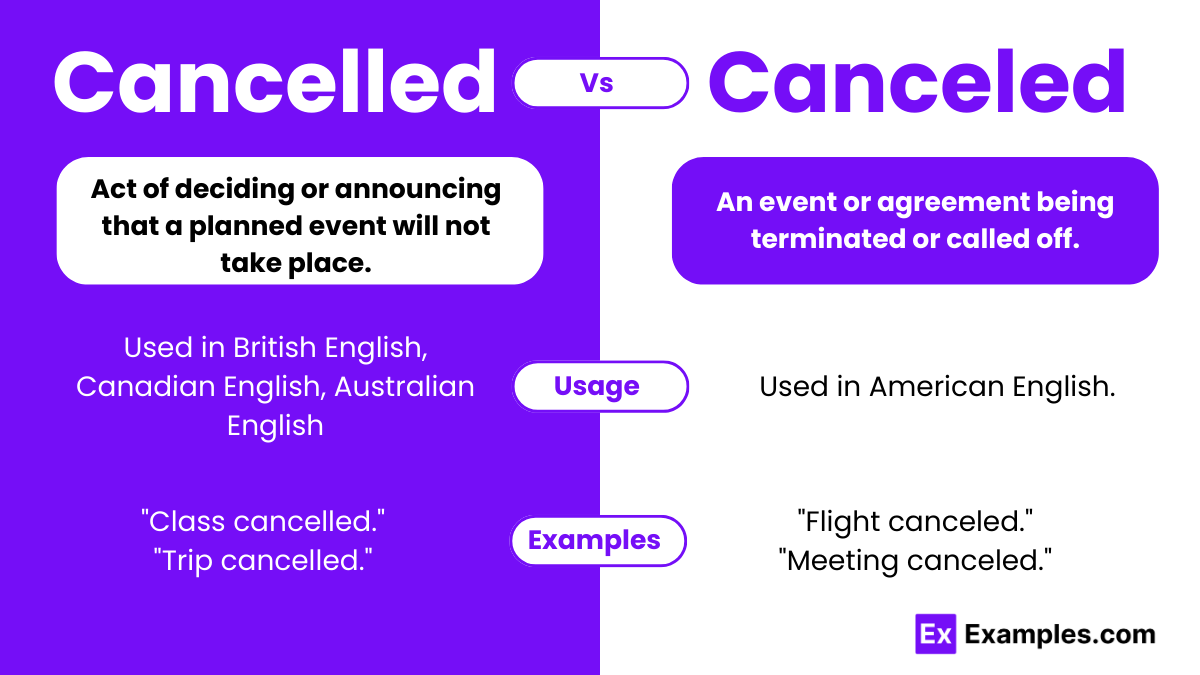Cancelled vs Canceled – Examples, Differences, Usage
Ever stumbled over choosing between canceled and cancelled in an email or essay and wondered which is correct? You’re not alone. This common spelling dilemma has puzzled many, from diligent students to seasoned professionals. The truth is, both spellings are acceptable, but the preference hinges on your geographical location or the audience you’re addressing.
We’ll explore the origins and nuances of “canceled” versus “cancelled,” equipping you with the knowledge to confidently select the appropriate spelling. Whether for academic assignments, professional emails, or social media posts, understanding this distinction will enhance your writing precision and clarity. Let’s embark on this linguistic journey to resolve once and for all the canceled versus cancelled debate, ensuring you’re prepared to use each spelling accurately in your communications.
Cancelled and Canceled – Meanings
“Cancelled” and “Canceled” both refer to the act of deciding or announcing that a planned event will not take place. The difference in spelling does not change the meaning of the word; instead, it reflects a variation in spelling between British English (“cancelled”) and American English (“canceled”). Both versions convey the same action—stopping an event or agreement from proceeding as planned. This could apply to a wide range of situations, from a meeting or party being called off to a television show being discontinued, or a contract being terminated. The choice between “cancelled” and “canceled” typically depends on the regional or stylistic preference of the writer.
Difference Between Cancelled and Canceled
| Aspect | Cancelled | Canceled |
|---|---|---|
| Spelling | Double “l” (ll). | Single “l” (l). |
| Usage | Preferred in British English, Canadian English, Australian English, and other Commonwealth nations. | Preferred in American English. |
| Meaning | The act of deciding that an organized event will not happen. | Identical to “cancelled” – an event or agreement being terminated or called off. |
| Example Sentence | “The meeting was cancelled due to bad weather.” | “The flight was canceled because of the storm.” |
| Grammar Rule | Follows the British rule of doubling the final consonant when adding an ending that begins with a vowel if the final syllable is stressed. | Follows the American convention of not doubling the consonant when adding a suffix if the final syllable is not stressed. |
| Pronunciation | Pronounced the same way as “canceled”. | Pronounced the same way as “cancelled”. |
Examples of Cancelled and Canceled

Cancelled vs. Canceled: American Examples
- “The concert was canceled at the last minute.”
- “Due to unforeseen circumstances, our appointment tomorrow has been canceled.”
- “The airline canceled flights because of the hurricane.”
- “The subscription service was canceled after a three-month trial.”
- “He canceled his gym membership due to lack of use.”
Cancelled vs. Canceled: British Examples
- “The football match was cancelled due to heavy rain.”
- “Our meeting scheduled for Friday has been cancelled, unfortunately.”
- “Flights to London were cancelled amidst the snowstorm.”
- “She was disappointed to find out the event had been cancelled.”
- “After much deliberation, the festival was finally cancelled.”
When to Use Cancelled and Canceled

When to Use “Cancelled”:
- Use “cancelled” when writing for a British, Canadian, Australian, or other Commonwealth audience. This spelling conforms to the British English convention of doubling the final consonant before adding a suffix if the stress is on the final syllable.
- Example Contexts:
- Formal and informal communication within countries following British English norms.
- Academic writing, publications, or correspondence intended for a British or Commonwealth English-speaking audience.
- Social media posts or blogs targeting readers from countries where British English is the standard.
When to Use “Canceled”:
- opt for “canceled” when your audience is primarily American. The American English rule does not double the final consonant when adding a suffix if the final syllable is not stressed.
- Example Contexts:
- Professional emails, reports, and documents intended for an American audience.
- Texts, social media updates, and other forms of communication aimed at readers familiar with American English conventions.
- Academic assignments or publications when American English standards are specified or preferred.
Choosing between “cancelled” and “canceled” depends largely on your intended audience’s regional spelling standards.
FAQs
Which is correct canceled or cancelled?
Both “canceled” and “cancelled” are correct. The choice depends on whether you’re using American English (“canceled”) or British English (“cancelled”).
Is it cancelled or canceled in Canada?
In Canada, “cancelled” is the preferred spelling, following British English conventions, which is common in other Commonwealth countries.
Is it cancelled or canceled programming?
For American audiences, “canceled programming” is correct. For British or international audiences, “cancelled programming” would be the preferred spelling.
When did Cancelled become canceled?
“Canceled” has been the American English spelling since the early 19th century, following a broader American trend of simplifying spellings initiated by lexicographers like Noah Webster.



